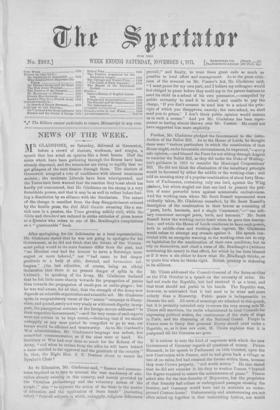As to Education, Mr. Gladstone said, "Reason and common- sense
required us to turn to account the vast machinery of edu- cation already existing in this country, and mainly provided by the Christian philanthropy and the voluntary action of the people ;" also "to separate the action of the State in the matter of education and the application of State funds" (including rates) " from all subjects in which, unhappily, religious differences
prevail ;" and finally, to trust these great ends as much as possible to local effort and management. As to the great criti- cism of the moment on Mr. Forster's Act, Mr. Gladstone said, "I must pause for my own part, and I believe my colleagues would feel obliged to pause before they could say to the parent desirous to send his child to a school of his own persuasion ,—compelled by public authority to send it to school and unable to pay the charge, If you don't consent to send him to a school the prin- ciple of which you disapprove, namely, the rate-school, we shall send you to prison.' I don't think public opinion would sustain us in such a course." And yet Mr. Gladstone has been repre- sented as having almost thrown over Mr. Forster. He could not have supported him more explicitly.


































